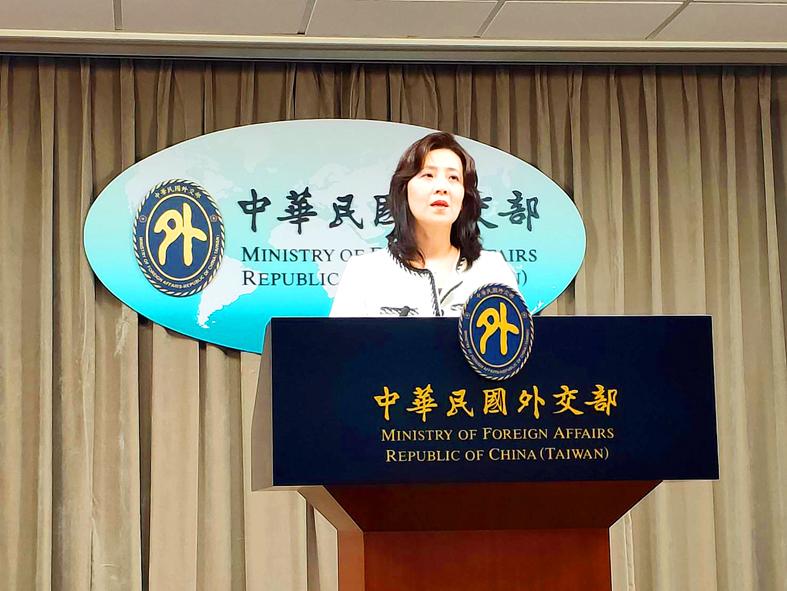Taiwan is working on “informal consultations” with member states of the Comprehensive and Progressive Agreement for Trans-Pacific Partnership (CPTPP) before it formally applies to join the trade bloc, Ministry of Foreign Affairs (MOFA) spokeswoman Joanne Ou (歐江安) said yesterday.
The ministry on Monday said there is an ongoing disinformation campaign online accusing the government of not having submitted an application and that the nation would not be admitted because of pressure from Beijing.
All nations hoping to join the trade group have to obtain the consensus of all member states through informal consultations before they can submit a formal application, Ou told a news briefing in Taipei.

Photo: Peng Wan-hsin, Taipei Times
Taiwan is in the middle of conducting informal consultations with the pact’s 11 member states, which are aware of the nation’s determination and the steps it is to take for participation, she said.
Joining the CPTPP is crucial for the nation’s economic growth, and Taiwan looks forward to establishing reciprocal trade relations with member states, Ou said.
Among the 11 countries, Malaysia, Peru, Chile and Brunei have not yet completed their domestic legal process for joining the pact, Ou said.
No other new member state would be admitted at present, she said.
The 11 members represent about 13 percent of global GDP, according to information from the Executive Yuan.
Taiwan’s ban on food imports from five Japanese prefectures after the 2011 Fukushima Dai-ichi nuclear power plant disaster is considered a hurdle for its bid to join the pact, while there is speculation that the government would seek to lift the ban.
The US in 2017 withdrew from the TPP, the precursor of the CPTPP.
Kurt Campbell, a former US assistant secretary of state for East Asian and Pacific Affairs, earlier this month warned about China’s growing clout in regional and global economy.
Beijing has joined the 15-country Regional Comprehensive Economic Partnership and has expressed an interest in the CPTPP, which should sound a knell for Washington, Campbell said.
He added that he did not think US president-elect Joe Biden’s administration would step into a multilateral institution very soon given the country’s domestic instability.
Additional reporting by CNA

CHANGING LANDSCAPE: Many of the part-time programs for educators were no longer needed, as many teachers obtain a graduate degree before joining the workforce, experts said Taiwanese universities this year canceled 86 programs, Ministry of Education data showed, with educators attributing the closures to the nation’s low birthrate as well as shifting trends. Fifty-three of the shuttered programs were part-time postgraduate degree programs, about 62 percent of the total, the most in the past five years, the data showed. National Taiwan Normal University (NTNU) discontinued the most part-time master’s programs, at 16: chemistry, life science, earth science, physics, fine arts, music, special education, health promotion and health education, educational psychology and counseling, education, design, Chinese as a second language, library and information sciences, mechatronics engineering, history, physical education

The Chinese military has boosted its capability to fight at a high tempo using the element of surprise and new technology, the Ministry of National Defense said in the Quadrennial Defense Review (QDR) published on Monday last week. The ministry highlighted Chinese People’s Liberation Army (PLA) developments showing significant changes in Beijing’s strategy for war on Taiwan. The PLA has made significant headway in building capabilities for all-weather, multi-domain intelligence, surveillance, operational control and a joint air-sea blockade against Taiwan’s lines of communication, it said. The PLA has also improved its capabilities in direct amphibious assault operations aimed at seizing strategically important beaches,

‘MALIGN PURPOSE’: Governments around the world conduct espionage operations, but China’s is different, as its ultimate goal is annexation, a think tank head said Taiwan is facing a growing existential threat from its own people spying for China, experts said, as the government seeks to toughen measures to stop Beijing’s infiltration efforts and deter Taiwanese turncoats. While Beijing and Taipei have been spying on each other for years, experts said that espionage posed a bigger threat to Taiwan due to the risk of a Chinese attack. Taiwan’s intelligence agency said China used “diverse channels and tactics” to infiltrate the nation’s military, government agencies and pro-China organizations. The main targets were retired and active members of the military, persuaded by money, blackmail or pro-China ideology to steal

DEADLOCK: As the commission is unable to forum a quorum to review license renewal applications, the channel operators are not at fault and can air past their license date The National Communications Commission (NCC) yesterday said that the Public Television Service (PTS) and 36 other television and radio broadcasters could continue airing, despite the commission’s inability to meet a quorum to review their license renewal applications. The licenses of PTS and the other channels are set to expire between this month and June. The National Communications Commission Organization Act (國家通訊傳播委員會組織法) stipulates that the commission must meet the mandated quorum of four to hold a valid meeting. The seven-member commission currently has only three commissioners. “We have informed the channel operators of the progress we have made in reviewing their license renewal applications, and